Eswatini - SZ - SWZ - SWZ - Africa
Last updated: January 05, 2026
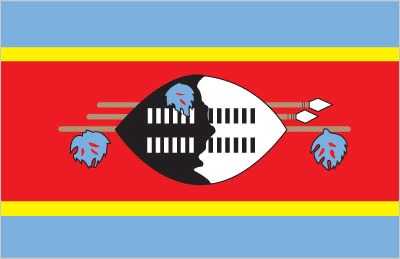
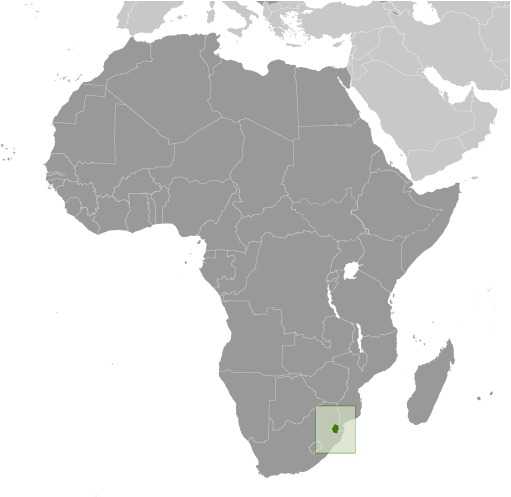
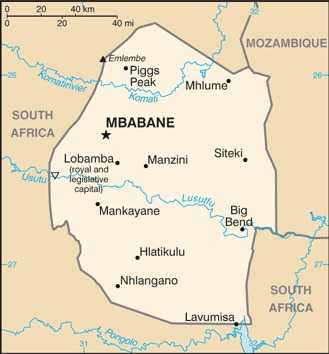
Eswatini Images
Eswatini Factbook Data
Diplomatic representation from the US
chief of mission: Ambassador (vacant) Chargé d’Affaires Marc WEINSTOCK (since August 2025)
embassy: Corner of MR 103 and Cultural Center Drive, Ezulwini, P.O. Box D202, The Gables, H106
mailing address: 2350 Mbabane Place, Washington DC 20521-2350
telephone: (268) 2417-9000
FAX: [268] 2416-3344
email address and website:
ConsularMbabane@state.gov
Homepage - U.S. Embassy in Eswatini (usembassy.gov)
embassy: Corner of MR 103 and Cultural Center Drive, Ezulwini, P.O. Box D202, The Gables, H106
mailing address: 2350 Mbabane Place, Washington DC 20521-2350
telephone: (268) 2417-9000
FAX: [268] 2416-3344
email address and website:
ConsularMbabane@state.gov
Homepage - U.S. Embassy in Eswatini (usembassy.gov)
Age structure
0-14 years: 31.6% (male 180,328/female 179,840)
15-64 years: 64.3% (male 341,298/female 390,884)
65 years and over: 4% (2024 est.) (male 16,974/female 28,765)
15-64 years: 64.3% (male 341,298/female 390,884)
65 years and over: 4% (2024 est.) (male 16,974/female 28,765)
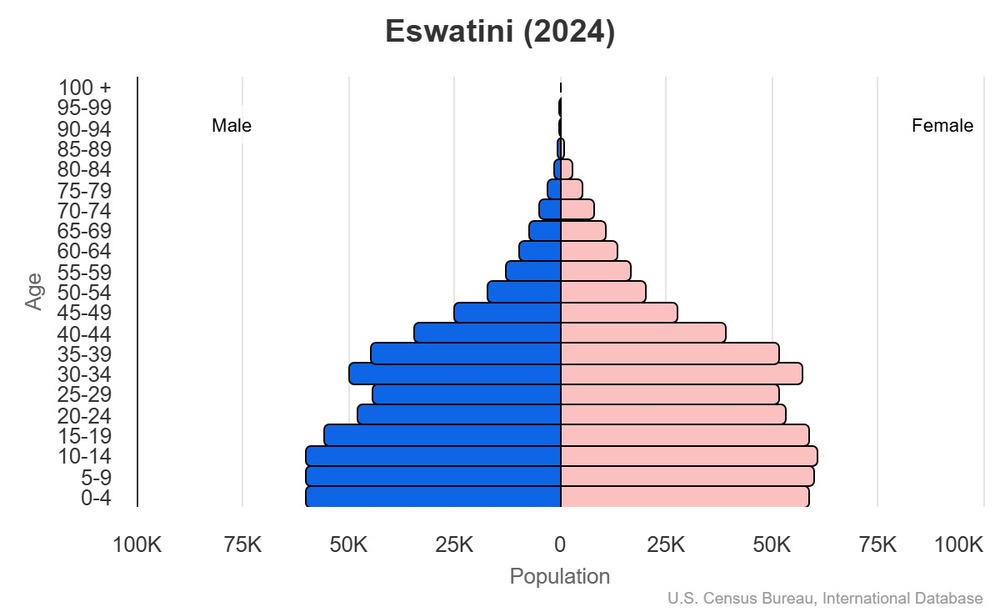
This is the population pyramid for Eswatini. A population pyramid illustrates the age and sex structure of a country's population and may provide insights about political and social stability, as well as economic development. The population is distributed along the horizontal axis, with males shown on the left and females on the right. The male and female populations are broken down into 5-year age groups represented as horizontal bars along the vertical axis, with the youngest age groups at the bottom and the oldest at the top. The shape of the population pyramid gradually evolves over time based on fertility, mortality, and international migration trends.
For additional information, please see the entry for Population pyramid on the Definitions and Notes page.
For additional information, please see the entry for Population pyramid on the Definitions and Notes page.
Geographic coordinates
26 30 S, 31 30 E
Sex ratio
at birth: 1.03 male(s)/female
0-14 years: 1 male(s)/female
15-64 years: 0.87 male(s)/female
65 years and over: 0.59 male(s)/female
total population: 0.9 male(s)/female (2024 est.)
0-14 years: 1 male(s)/female
15-64 years: 0.87 male(s)/female
65 years and over: 0.59 male(s)/female
total population: 0.9 male(s)/female (2024 est.)
Natural hazards
drought
Area - comparative
slightly smaller than New Jersey
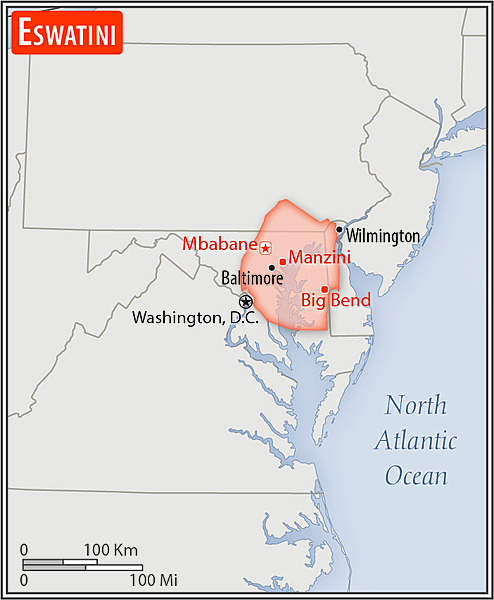
slightly smaller than New Jersey
Background
A Swazi kingdom was founded in the mid-18th century and ruled by a series of kings, including MSWATI II, a 19th century ruler whose name was adopted for the country and its predominant ethnic group. European countries defined the kingdom’s modern borders during the late-19th century, and Swaziland (as it became known) was administered as a UK high commission territory from 1903 until its independence in 1968. A new constitution that came into effect in 2005 included provisions for a more independent parliament and judiciary, but the legal status of political parties remains unclear, and the kingdom is still considered an absolute monarchy. King MSWATI III renamed the country from Swaziland to Eswatini in 2018 to reflect the name most commonly used by its citizens.
In 2021, MSWATI III used security forces to suppress prodemocracy protests. A national dialogue and reconciliation process agreed to in the wake of violence has not materialized. In November 2023, King MSWATI III appointed a new prime minister following peaceful national elections. Despite its classification as a lower-middle income country, Eswatini suffers from severe poverty, corruption, and high unemployment. Eswatini has the world's highest HIV/AIDS prevalence rate, although recent years have shown marked declines in new infections. Eswatini is the only country in Africa that recognizes Taiwan.
In 2021, MSWATI III used security forces to suppress prodemocracy protests. A national dialogue and reconciliation process agreed to in the wake of violence has not materialized. In November 2023, King MSWATI III appointed a new prime minister following peaceful national elections. Despite its classification as a lower-middle income country, Eswatini suffers from severe poverty, corruption, and high unemployment. Eswatini has the world's highest HIV/AIDS prevalence rate, although recent years have shown marked declines in new infections. Eswatini is the only country in Africa that recognizes Taiwan.
Environmental issues
limited supplies of potable water; overhunting depleting wildlife; population growth, deforestation, and overgrazing lead to soil erosion and soil degradation
International environmental agreements
party to: Biodiversity, Climate Change, Climate Change-Kyoto Protocol, Climate Change-Paris Agreement, Comprehensive Nuclear Test Ban, Desertification, Endangered Species, Hazardous Wastes, Law of the Sea, Nuclear Test Ban, Ozone Layer Protection, Wetlands
signed, but not ratified: none of the selected agreements
signed, but not ratified: none of the selected agreements
Military expenditures
1.4% of GDP (2024 est.)
1.4% of GDP (2023 est.)
1.6% of GDP (2022 est.)
1.7% of GDP (2021 est.)
1.8% of GDP (2020 est.)
1.4% of GDP (2023 est.)
1.6% of GDP (2022 est.)
1.7% of GDP (2021 est.)
1.8% of GDP (2020 est.)
Population below poverty line
58.9% (2016 est.)
note: % of population with income below national poverty line
note: % of population with income below national poverty line
Household income or consumption by percentage share
lowest 10%: 1.4% (2016 est.)
highest 10%: 42.7% (2016 est.)
note: % share of income accruing to lowest and highest 10% of population
highest 10%: 42.7% (2016 est.)
note: % share of income accruing to lowest and highest 10% of population
Exports - commodities
scented mixtures, raw sugar, industrial acids/oils/alcohols, garments, wood (2023)
note: top five export commodities based on value in dollars
note: top five export commodities based on value in dollars
Exports - partners
South Africa 61%, Ireland 4%, Mozambique 4%, Kenya 4%, Nigeria 3% (2023)
note: top five export partners based on percentage share of exports
note: top five export partners based on percentage share of exports
Administrative divisions
4 regions; Hhohho, Lubombo, Manzini, Shiselweni
Agricultural products
sugarcane, maize, root vegetables, grapefruits, oranges, milk, pineapples, bananas, beef, sweet potatoes (2023)
note: top ten agricultural products based on tonnage
note: top ten agricultural products based on tonnage
Military and security forces
Umbutfo Eswatini Defense Force (UEDF): Army (includes a small air wing); the Royal Eswatini Police Service (REPS) (2025)
Budget
revenues: $1.217 billion (2021 est.)
expenditures: $1.439 billion (2021 est.)
note: central government revenues and expenses (excluding grants/extrabudgetary units/social security funds) converted to US dollars at average official exchange rate for year indicated
expenditures: $1.439 billion (2021 est.)
note: central government revenues and expenses (excluding grants/extrabudgetary units/social security funds) converted to US dollars at average official exchange rate for year indicated
Capital
name: Mbabane (administrative capital); Lobamba (royal and legislative capital)
geographic coordinates: 26 19 S, 31 08 E
time difference: UTC+2 (7 hours ahead of Washington, DC, during Standard Time)
etymology: the origin of the name is unclear; it may come from the Mbabane River next to the city, whose name is said to derive from the word lubabe, a type of shrub; another theory cites a local chief, Mbabane KUNENE, as the source of the name
geographic coordinates: 26 19 S, 31 08 E
time difference: UTC+2 (7 hours ahead of Washington, DC, during Standard Time)
etymology: the origin of the name is unclear; it may come from the Mbabane River next to the city, whose name is said to derive from the word lubabe, a type of shrub; another theory cites a local chief, Mbabane KUNENE, as the source of the name
Imports - commodities
refined petroleum, electricity, plastic products, cotton fabric, garments (2023)
note: top five import commodities based on value in dollars
note: top five import commodities based on value in dollars
Climate
varies from tropical to near temperate
Coastline
0 km (landlocked)
Constitution
history: previous 1968, 1978; latest signed by the king 26 July 2005, effective 8 February 2006
amendment process: proposed at a joint sitting of both houses of Parliament; passage requires majority vote by both houses and/or majority vote in a referendum, and assent of the king; passage of amendments affecting "specially entrenched" constitutional provisions requires at least three-fourths majority vote by both houses, passage by simple majority vote in a referendum, and assent of the king; passage of "entrenched" provisions requires at least two-thirds majority vote of both houses, passage in a referendum, and assent of the king
amendment process: proposed at a joint sitting of both houses of Parliament; passage requires majority vote by both houses and/or majority vote in a referendum, and assent of the king; passage of amendments affecting "specially entrenched" constitutional provisions requires at least three-fourths majority vote by both houses, passage by simple majority vote in a referendum, and assent of the king; passage of "entrenched" provisions requires at least two-thirds majority vote of both houses, passage in a referendum, and assent of the king
Exchange rates
emalangeni per US dollar -
Exchange rates:
18.318 (2024 est.)
18.454 (2023 est.)
16.362 (2022 est.)
14.783 (2021 est.)
16.47 (2020 est.)
Exchange rates:
18.318 (2024 est.)
18.454 (2023 est.)
16.362 (2022 est.)
14.783 (2021 est.)
16.47 (2020 est.)
Executive branch
chief of state: King MSWATI III (since 25 April 1986)
head of government: Prime Minister Russell DLAMINI (since 6 November 2023)
cabinet: Cabinet recommended by the prime minister, confirmed by the monarch; at least one-half of the cabinet membership must be appointed from among elected members of the House of Assembly
election/appointment process: the monarchy is hereditary; prime minister appointed by the monarch from among members of the House of Assembly
head of government: Prime Minister Russell DLAMINI (since 6 November 2023)
cabinet: Cabinet recommended by the prime minister, confirmed by the monarch; at least one-half of the cabinet membership must be appointed from among elected members of the House of Assembly
election/appointment process: the monarchy is hereditary; prime minister appointed by the monarch from among members of the House of Assembly
Flag
description: three horizontal bands of blue (top), red (triple-width), and blue; the red band is edged in yellow, with a large black-and-white shield in the center that covers two horizontal spears and a staff with feather tassels
meaning: blue stands for peace and stability, red for past struggles, and yellow for the mineral resources of the country; the shield, spears, and staff symbolize protection from enemies, and the shield colors stand for ethnic groups living in peaceful coexistence
meaning: blue stands for peace and stability, red for past struggles, and yellow for the mineral resources of the country; the shield, spears, and staff symbolize protection from enemies, and the shield colors stand for ethnic groups living in peaceful coexistence
Independence
6 September 1968 (from the UK)
Industries
soft drink concentrates, coal, forestry, sugar processing, textiles, and apparel
Judicial branch
highest court(s): Supreme Court (consists of the chief justice and at least 4 justices) and the High Court (consists of the chief justice ex officio and 4 justices)
judge selection and term of office: justices of the Supreme Court and High Court appointed by the monarch on the advice of the Judicial Service Commission (JSC), a judicial advisory body consisting of the Supreme Court Chief Justice, 4 members appointed by the monarch, and the chairman of the Civil Service Commission; justices of both courts eligible for retirement at age 65 with mandatory retirement at age 75
subordinate courts: magistrates' courts; National Swazi Courts for administering customary/traditional laws (jurisdiction restricted to customary law for Swazi citizens)
note: the Supreme Court has jurisdiction in all constitutional matters
judge selection and term of office: justices of the Supreme Court and High Court appointed by the monarch on the advice of the Judicial Service Commission (JSC), a judicial advisory body consisting of the Supreme Court Chief Justice, 4 members appointed by the monarch, and the chairman of the Civil Service Commission; justices of both courts eligible for retirement at age 65 with mandatory retirement at age 75
subordinate courts: magistrates' courts; National Swazi Courts for administering customary/traditional laws (jurisdiction restricted to customary law for Swazi citizens)
note: the Supreme Court has jurisdiction in all constitutional matters
Land boundaries
total: 546 km
border countries (2): Mozambique 108 km; South Africa 438 km
border countries (2): Mozambique 108 km; South Africa 438 km
Land use
agricultural land: 69.5% (2023 est.)
arable land: 10.3% (2023 est.)
permanent crops: 1% (2023 est.)
permanent pasture: 58.1% (2023 est.)
forest: 25.4% (2023 est.)
other: 5.2% (2023 est.)
arable land: 10.3% (2023 est.)
permanent crops: 1% (2023 est.)
permanent pasture: 58.1% (2023 est.)
forest: 25.4% (2023 est.)
other: 5.2% (2023 est.)
Legal system
mixed system of civil, common, and customary law
Legislative branch
legislature name: Parliament (Libandla)
legislative structure: bicameral
legislative structure: bicameral
Literacy
total population: 90.8% (2022 est.)
male: 91.1% (2022 est.)
female: 90.4% (2022 est.)
male: 91.1% (2022 est.)
female: 90.4% (2022 est.)
Maritime claims
none (landlocked)
International organization participation
ACP, AfDB, AU, C, COMESA, FAO, G-77, IAEA, IBRD, ICAO, ICRM, IDA, IFAD, IFC, IFRCS, ILO, IMF, IMO, Interpol, IOC, IOM, ISO (correspondent), ITSO, ITU, ITUC (NGOs), MIGA, NAM, OPCW, PCA, SACU, SADC, UN, UNCTAD, UNESCO, UNIDO, UNWTO, UPU, WCO, WHO, WIPO, WMO, WTO
National holiday
Independence Day (Somhlolo Day), 6 September (1968)
Nationality
noun: liSwati (singular), emaSwati (plural); note - former term, Swazi(s), still used among English speakers
adjective: Swati; note - former term, Swazi, still used among English speakers
adjective: Swati; note - former term, Swazi, still used among English speakers
Natural resources
asbestos, coal, clay, cassiterite, hydropower, forests, small gold and diamond deposits, quarry stone, and talc
Geography - note
landlocked; almost completely surrounded by South Africa
Economic overview
landlocked southern African economy; South African trade dependent and currency pegging; CMA and SACU member state; COVID-19 economic slowdown; growing utilities inflation; persistent poverty and unemployment; HIV/AIDS labor force disruptions
Political parties
political parties exist but conditions for their operations, particularly in elections, are undefined, legally unclear, or culturally restricted; the following are considered political associations:
African United Democratic Party or AUDP
Ngwane National Liberatory Congress or NNLC
People's United Democratic Movement or PUDEMO
Swazi Democratic Party or SWADEPA
African United Democratic Party or AUDP
Ngwane National Liberatory Congress or NNLC
People's United Democratic Movement or PUDEMO
Swazi Democratic Party or SWADEPA
Railways
total: 301 km (2014)
narrow gauge: 301 km (2014) 1.067-m gauge
narrow gauge: 301 km (2014) 1.067-m gauge
Suffrage
18 years of age
Terrain
mostly mountains and hills; some moderately sloping plains
Government type
absolute monarchy
Country name
conventional long form: Kingdom of Eswatini
conventional short form: Eswatini
local long form: Umbuso weSwatini
local short form: eSwatini
former: Swaziland
etymology: the country name derives from 19th century King MSWATI II, under whose rule Swati territory was expanded and unified
note: pronounced ay-swatini or eh-swatini
conventional short form: Eswatini
local long form: Umbuso weSwatini
local short form: eSwatini
former: Swaziland
etymology: the country name derives from 19th century King MSWATI II, under whose rule Swati territory was expanded and unified
note: pronounced ay-swatini or eh-swatini
Location
Southern Africa, between Mozambique and South Africa
Map references
Africa
Irrigated land
500 sq km (2012)
Diplomatic representation in the US
chief of mission: Ambassador Kennedy Fitzgerald GROENING (7 June 2022)
chancery: 1712 New Hampshire Avenue NW, Washington, DC 20009
telephone: [1] (202) 234-5002
FAX: [1] (202) 234-8254
email address and website:
swaziland@compuserve.com
chancery: 1712 New Hampshire Avenue NW, Washington, DC 20009
telephone: [1] (202) 234-5002
FAX: [1] (202) 234-8254
email address and website:
swaziland@compuserve.com
Internet users
percent of population: 58% (2023 est.)
Internet country code
.sz
GDP (official exchange rate)
$4.892 billion (2024 est.)
note: data in current dollars at official exchange rate
note: data in current dollars at official exchange rate
Total renewable water resources
4.51 billion cubic meters (2022 est.)
Urbanization
urban population: 24.8% of total population (2023)
rate of urbanization: 2.42% annual rate of change (2020-25 est.)
rate of urbanization: 2.42% annual rate of change (2020-25 est.)
Broadcast media
1 state-owned TV station; satellite dishes can access South African providers; state-owned radio network with 3 channels; 1 private radio station (2019)
Drinking water source
improved:
urban: 98% of population (2022 est.)
rural: 65.5% of population (2022 est.)
total: 73.5% of population (2022 est.)
unimproved:
urban: 2% of population (2022 est.)
rural: 34.5% of population (2022 est.)
total: 26.5% of population (2022 est.)
urban: 98% of population (2022 est.)
rural: 65.5% of population (2022 est.)
total: 73.5% of population (2022 est.)
unimproved:
urban: 2% of population (2022 est.)
rural: 34.5% of population (2022 est.)
total: 26.5% of population (2022 est.)
National anthem(s)
title: "Nkulunkulu Mnikati wetibusiso temaSwati" (O God, Bestower of the Blessings of the Swazi)
lyrics/music: Andrease Enoke Fanyana SIMELANE/David Kenneth RYCROFT
history: adopted 1968; uses elements of both ethnic Swazi and Western music styles
lyrics/music: Andrease Enoke Fanyana SIMELANE/David Kenneth RYCROFT
history: adopted 1968; uses elements of both ethnic Swazi and Western music styles
This is an audio of the National Anthem for Swaziland. The national anthem is generally a patriotic musical composition - usually in the form of a song or hymn of praise - that evokes and eulogizes the history, traditions, or struggles of a nation or its people. National anthems can be officially recognized as a national song by a country's constitution or by an enacted law, or simply by tradition. Although most anthems contain lyrics, some do not.
Major urban areas - population
68,000 MBABANE (capital) (2018)
International law organization participation
accepts compulsory ICJ jurisdiction with reservations; non-party state to the ICCt
Physician density
0.56 physicians/1,000 population (2023)
National symbol(s)
lion, elephant
GDP - composition, by end use
household consumption: 64% (2023 est.)
government consumption: 19.5% (2023 est.)
investment in fixed capital: 16.1% (2023 est.)
investment in inventories: 3.1% (2023 est.)
exports of goods and services: 48.7% (2023 est.)
imports of goods and services: -51.4% (2023 est.)
note: figures may not total 100% due to rounding or gaps in data collection
government consumption: 19.5% (2023 est.)
investment in fixed capital: 16.1% (2023 est.)
investment in inventories: 3.1% (2023 est.)
exports of goods and services: 48.7% (2023 est.)
imports of goods and services: -51.4% (2023 est.)
note: figures may not total 100% due to rounding or gaps in data collection
Dependency ratios
total dependency ratio: 55.4 (2024 est.)
youth dependency ratio: 49.2 (2024 est.)
elderly dependency ratio: 6.2 (2024 est.)
potential support ratio: 16 (2024 est.)
youth dependency ratio: 49.2 (2024 est.)
elderly dependency ratio: 6.2 (2024 est.)
potential support ratio: 16 (2024 est.)
Citizenship
citizenship by birth: no
citizenship by descent only: both parents must be citizens of Eswatini
dual citizenship recognized: no
residency requirement for naturalization: 5 years
citizenship by descent only: both parents must be citizens of Eswatini
dual citizenship recognized: no
residency requirement for naturalization: 5 years
Population distribution
because of its mountainous terrain, the population distribution is uneven throughout the country, concentrating primarily in valleys and plains as shown in this population distribution map
Electricity access
electrification - total population: 82.3% (2022 est.)
electrification - urban areas: 86.1%
electrification - rural areas: 81.6%
electrification - urban areas: 86.1%
electrification - rural areas: 81.6%
Civil aircraft registration country code prefix
3DC
Sanitation facility access
improved:
urban: 92.4% of population (2022 est.)
rural: 84.2% of population (2022 est.)
total: 86.2% of population (2022 est.)
unimproved:
urban: 7.6% of population (2022 est.)
rural: 15.8% of population (2022 est.)
total: 13.8% of population (2022 est.)
urban: 92.4% of population (2022 est.)
rural: 84.2% of population (2022 est.)
total: 86.2% of population (2022 est.)
unimproved:
urban: 7.6% of population (2022 est.)
rural: 15.8% of population (2022 est.)
total: 13.8% of population (2022 est.)
Ethnic groups
predominantly Swazi; smaller populations of other African ethnic groups, including the Zulu, as well as people of European ancestry
Religions
Christian 90% (Zionist - a blend of Christianity and traditional African religions - 40%, Roman Catholic 20%, other Christian 30% - includes Anglican, Methodist, Church of Jesus Christ, Jehovah's Witness), Muslim 2%, other 8% (includes Baha'i, Buddhist, Hindu, indigenous, Jewish) (2015 est.)
Languages
English (official, used for government business), siSwati (official)
Imports - partners
South Africa 71%, China 8%, India 4%, USA 2%, Mozambique 1% (2023)
note: top five import partners based on percentage share of imports
note: top five import partners based on percentage share of imports
Refugees and internally displaced persons
refugees: 4,459 (2024 est.)
IDPs: 56 (2024 est.)
IDPs: 56 (2024 est.)
Elevation
highest point: Emlembe 1,862 m
lowest point: Great Usutu River 21 m
mean elevation: 305 m
lowest point: Great Usutu River 21 m
mean elevation: 305 m
Health expenditure
7% of GDP (2021)
11.3% of national budget (2022 est.)
11.3% of national budget (2022 est.)
Total water withdrawal
municipal: 41.3 million cubic meters (2022 est.)
industrial: 20.7 million cubic meters (2022 est.)
agricultural: 1.006 billion cubic meters (2022 est.)
industrial: 20.7 million cubic meters (2022 est.)
agricultural: 1.006 billion cubic meters (2022 est.)
Waste and recycling
municipal solid waste generated annually: 218,200 tons (2024 est.)
percent of municipal solid waste recycled: 17.3% (2022 est.)
percent of municipal solid waste recycled: 17.3% (2022 est.)
Coal
production: 253,000 metric tons (2023 est.)
consumption: 202,000 metric tons (2023 est.)
exports: 4,000 metric tons (2023 est.)
imports: 201,000 metric tons (2023 est.)
proven reserves: 4.644 billion metric tons (2023 est.)
consumption: 202,000 metric tons (2023 est.)
exports: 4,000 metric tons (2023 est.)
imports: 201,000 metric tons (2023 est.)
proven reserves: 4.644 billion metric tons (2023 est.)
Electricity generation sources
fossil fuels: 3.1% of total installed capacity (2023 est.)
solar: 4.9% of total installed capacity (2023 est.)
hydroelectricity: 54.4% of total installed capacity (2023 est.)
biomass and waste: 37.6% of total installed capacity (2023 est.)
solar: 4.9% of total installed capacity (2023 est.)
hydroelectricity: 54.4% of total installed capacity (2023 est.)
biomass and waste: 37.6% of total installed capacity (2023 est.)
Petroleum
refined petroleum consumption: 6,000 bbl/day (2023 est.)
Currently married women (ages 15-49)
36.4% (2022 est.)
Remittances
1.7% of GDP (2023 est.)
2.7% of GDP (2022 est.)
2.8% of GDP (2021 est.)
note: personal transfers and compensation between resident and non-resident individuals/households/entities
2.7% of GDP (2022 est.)
2.8% of GDP (2021 est.)
note: personal transfers and compensation between resident and non-resident individuals/households/entities
Child marriage
women married by age 15: 0.1% (2022)
women married by age 18: 1.9% (2022)
men married by age 18: 0% (2022)
women married by age 18: 1.9% (2022)
men married by age 18: 0% (2022)
Legislative branch - lower chamber
chamber name: House of Assembly
number of seats: 74 (59 directly elected; 4 indirectly elected; 10 appointed)
electoral system: plurality/majority
scope of elections: full renewal
term in office: 5 years
most recent election date: 9/29/2023
percentage of women in chamber: 21.6%
expected date of next election: September 2028
note: four women, one representing each region, elected by the members if representation of elected women is less than 30%
number of seats: 74 (59 directly elected; 4 indirectly elected; 10 appointed)
electoral system: plurality/majority
scope of elections: full renewal
term in office: 5 years
most recent election date: 9/29/2023
percentage of women in chamber: 21.6%
expected date of next election: September 2028
note: four women, one representing each region, elected by the members if representation of elected women is less than 30%
Legislative branch - upper chamber
chamber name: Senate
number of seats: 30 (10 indirectly elected; 20 appointed)
scope of elections: full renewal
term in office: 5 years
most recent election date: 11/6/2023
percentage of women in chamber: 46.7%
expected date of next election: November 2028
number of seats: 30 (10 indirectly elected; 20 appointed)
scope of elections: full renewal
term in office: 5 years
most recent election date: 11/6/2023
percentage of women in chamber: 46.7%
expected date of next election: November 2028
National coat of arms
the national coat of arms was adopted in 1968 after independence from the United Kingdom; two national symbols, the lion (representing the king of Eswatini) and the elephant (representing the queen mother), support a traditional Nguni shield; above the shield is the king's lidlabe, or crown of feathers, and at the bottom is Eswatini's motto, Siyinqaba, or "We are the fortress”
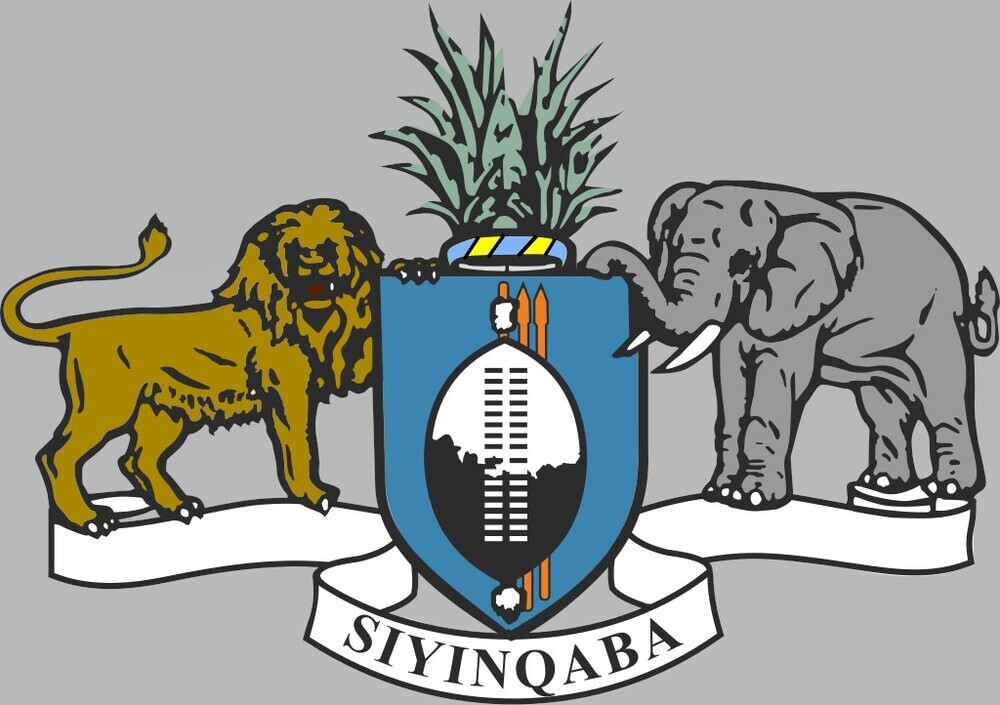
Eswatini's coat of arms
National color(s)
blue, yellow, red
Particulate matter emissions
16.4 micrograms per cubic meter (2019 est.)
Labor force
390,600 (2024 est.)
note: number of people ages 15 or older who are employed or seeking work
note: number of people ages 15 or older who are employed or seeking work
Youth unemployment rate (ages 15-24)
total: 58.2% (2024 est.)
male: 56% (2024 est.)
female: 60.3% (2024 est.)
note: % of labor force ages 15-24 seeking employment
male: 56% (2024 est.)
female: 60.3% (2024 est.)
note: % of labor force ages 15-24 seeking employment
Debt - external
$923.266 million (2023 est.)
note: present value of external debt in current US dollars
note: present value of external debt in current US dollars
Maternal mortality ratio
118 deaths/100,000 live births (2023 est.)
Reserves of foreign exchange and gold
$479.261 million (2023 est.)
$452.352 million (2022 est.)
$572.282 million (2021 est.)
note: holdings of gold (year-end prices)/foreign exchange/special drawing rights in current dollars
$452.352 million (2022 est.)
$572.282 million (2021 est.)
note: holdings of gold (year-end prices)/foreign exchange/special drawing rights in current dollars
Public debt
35.9% of GDP (2021 est.)
note: central government debt as a % of GDP
note: central government debt as a % of GDP
Unemployment rate
34.4% (2024 est.)
35.1% (2023 est.)
35.4% (2022 est.)
note: % of labor force seeking employment
35.1% (2023 est.)
35.4% (2022 est.)
note: % of labor force seeking employment
Population
total: 1,138,089 (2024 est.)
male: 538,600
female: 599,489
male: 538,600
female: 599,489
Carbon dioxide emissions
1.326 million metric tonnes of CO2 (2023 est.)
from coal and metallurgical coke: 410,000 metric tonnes of CO2 (2023 est.)
from petroleum and other liquids: 916,000 metric tonnes of CO2 (2023 est.)
from coal and metallurgical coke: 410,000 metric tonnes of CO2 (2023 est.)
from petroleum and other liquids: 916,000 metric tonnes of CO2 (2023 est.)
Area
total : 17,364 sq km
land: 17,204 sq km
water: 160 sq km
land: 17,204 sq km
water: 160 sq km
Taxes and other revenues
24.5% (of GDP) (2021 est.)
note: central government tax revenue as a % of GDP
note: central government tax revenue as a % of GDP
Real GDP (purchasing power parity)
$12.885 billion (2024 est.)
$12.553 billion (2023 est.)
$12.135 billion (2022 est.)
note: data in 2021 dollars
$12.553 billion (2023 est.)
$12.135 billion (2022 est.)
note: data in 2021 dollars
Airports
16 (2025)
Telephones - mobile cellular
total subscriptions: 1.52 million (2023 est.)
subscriptions per 100 inhabitants: 122 (2022 est.)
subscriptions per 100 inhabitants: 122 (2022 est.)
Gini Index coefficient - distribution of family income
54.6 (2016 est.)
note: index (0-100) of income distribution; higher values represent greater inequality
note: index (0-100) of income distribution; higher values represent greater inequality
Inflation rate (consumer prices)
2.6% (2019 est.)
4.8% (2018 est.)
6.2% (2017 est.)
note: annual % change based on consumer prices
4.8% (2018 est.)
6.2% (2017 est.)
note: annual % change based on consumer prices
Current account balance
$107.534 million (2023 est.)
-$140.972 million (2022 est.)
$125.318 million (2021 est.)
note: balance of payments - net trade and primary/secondary income in current dollars
-$140.972 million (2022 est.)
$125.318 million (2021 est.)
note: balance of payments - net trade and primary/secondary income in current dollars
Real GDP per capita
$10,400 (2024 est.)
$10,200 (2023 est.)
$10,000 (2022 est.)
note: data in 2021 dollars
$10,200 (2023 est.)
$10,000 (2022 est.)
note: data in 2021 dollars
Broadband - fixed subscriptions
total: 34,000 (2023 est.)
subscriptions per 100 inhabitants: 3 (2023 est.)
subscriptions per 100 inhabitants: 3 (2023 est.)
Tobacco use
total: 8.5% (2025 est.)
male: 16.1% (2025 est.)
female: 1.2% (2025 est.)
male: 16.1% (2025 est.)
female: 1.2% (2025 est.)
Obesity - adult prevalence rate
16.5% (2016)
Energy consumption per capita
18.823 million Btu/person (2023 est.)
Electricity
installed generating capacity: 285,000 kW (2023 est.)
consumption: 1.308 billion kWh (2023 est.)
imports: 928.237 million kWh (2023 est.)
transmission/distribution losses: 167.476 million kWh (2023 est.)
consumption: 1.308 billion kWh (2023 est.)
imports: 928.237 million kWh (2023 est.)
transmission/distribution losses: 167.476 million kWh (2023 est.)
Children under the age of 5 years underweight
5% (2021 est.)
Imports
$2.351 billion (2023 est.)
$2.288 billion (2022 est.)
$2.173 billion (2021 est.)
note: balance of payments - imports of goods and services in current dollars
$2.288 billion (2022 est.)
$2.173 billion (2021 est.)
note: balance of payments - imports of goods and services in current dollars
Exports
$2.174 billion (2023 est.)
$2.095 billion (2022 est.)
$2.132 billion (2021 est.)
note: balance of payments - exports of goods and services in current dollars
$2.095 billion (2022 est.)
$2.132 billion (2021 est.)
note: balance of payments - exports of goods and services in current dollars
Heliports
1 (2025)
Telephones - fixed lines
total subscriptions: 42,000 (2023 est.)
subscriptions per 100 inhabitants: 3 (2023 est.)
subscriptions per 100 inhabitants: 3 (2023 est.)
Alcohol consumption per capita
total: 7.68 liters of pure alcohol (2019 est.)
beer: 2.45 liters of pure alcohol (2019 est.)
wine: 0.06 liters of pure alcohol (2019 est.)
spirits: 0 liters of pure alcohol (2019 est.)
other alcohols: 5.17 liters of pure alcohol (2019 est.)
beer: 2.45 liters of pure alcohol (2019 est.)
wine: 0.06 liters of pure alcohol (2019 est.)
spirits: 0 liters of pure alcohol (2019 est.)
other alcohols: 5.17 liters of pure alcohol (2019 est.)
Life expectancy at birth
total population: 60.7 years (2024 est.)
male: 58.7 years
female: 62.8 years
male: 58.7 years
female: 62.8 years
Real GDP growth rate
2.6% (2024 est.)
3.4% (2023 est.)
1.1% (2022 est.)
note: annual GDP % growth based on constant local currency
3.4% (2023 est.)
1.1% (2022 est.)
note: annual GDP % growth based on constant local currency
Industrial production growth rate
0.5% (2023 est.)
note: annual % change in industrial value added based on constant local currency
note: annual % change in industrial value added based on constant local currency
GDP - composition, by sector of origin
agriculture: 6.8% (2023 est.)
industry: 34.7% (2023 est.)
services: 51.7% (2023 est.)
note: figures may not total 100% due to non-allocated consumption not captured in sector-reported data
industry: 34.7% (2023 est.)
services: 51.7% (2023 est.)
note: figures may not total 100% due to non-allocated consumption not captured in sector-reported data
Education expenditure
6% of GDP (2024 est.)
19.2% national budget (2025 est.)
19.2% national budget (2025 est.)
Military equipment inventories and acquisitions
the UEDF has a small inventory of mostly older light weapons and equipment originating from Europe, South Africa, Taiwan, and the US (2025)
Military service age and obligation
18-35 years of age for voluntary military service for men and women; no conscription (2025)
Military and security service personnel strengths
estimated 3,000 active-duty Defense Force (2025)
Military - note
the UEDF’s primary mission is external defense, which includes mostly securing the borders; it also has domestic security responsibilities, including protecting members of the royal family; the king is the UEDF commander in chief and holds the position of minister of defense, although the UEDF reports to the Army commander and principal undersecretary of defense for day-to-day operations; the Royal Eswatini Police Service (REPS) is responsible for maintaining internal security as well as migration and border crossing enforcement; it is under the prime minister, although the king is the force’s titular commissioner in chief; the UEDF was originally created in 1973 as the Royal Swaziland Defense Force (2025)
Gross reproduction rate
1.3 (2025 est.)
Net migration rate
-3.68 migrant(s)/1,000 population (2025 est.)
Median age
total: 24.8 years (2025 est.)
male: 23.4 years
female: 25.8 years
male: 23.4 years
female: 25.8 years
Total fertility rate
2.64 children born/woman (2025 est.)
Infant mortality rate
total: 38 deaths/1,000 live births (2025 est.)
male: 40.7 deaths/1,000 live births
female: 32.5 deaths/1,000 live births
male: 40.7 deaths/1,000 live births
female: 32.5 deaths/1,000 live births
Death rate
8.3 deaths/1,000 population (2025 est.)
Birth rate
20.66 births/1,000 population (2025 est.)
Population growth rate
0.87% (2025 est.)